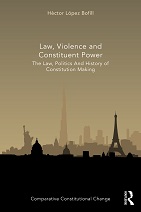by Héctor López Bofill (Routledge May 2021, 296 pages)
About the book
This book challenges traditional theories of constitution-making to advance an alternative view of constitutions as being founded on power which rests on violence.
The work argues that rather than the idea of a constitution being the result of political participation and deliberation, all power instead is based on violence. Hence the creation of a constitution is actually an act of coercion, where, through violence, one social group is able to impose itself over others. The book advocates that the presence of violence be used as an assessment of whether genuine constitutional transformation has taken place, and that the legitimacy of a constitutional order should be dependent upon the absence of killing.
The book will be essential reading for academics and researchers working in the areas of constitutional law and politics, legal and political theory, and constitutional history.
About the series
Comparative Constitutional Change has developed into a distinct field of constitutional law. It encompasses the study of constitutions through the way they change and covers a wide scope of topics and methodologies. Books in this series include work on developments in the functions of the constitution, the organization of powers and the protection of rights, as well as research that focuses on formal amendment rules and the relation between constituent and constituted power. The series includes comparative approaches along with books that focus on single jurisdictions, and brings together research monographs and edited collections which allow the expression of different schools of thought. While the focus is primarily on law, where relevant the series may also include political science, historical, philosophical and empirical approaches that explore constitutional change.
